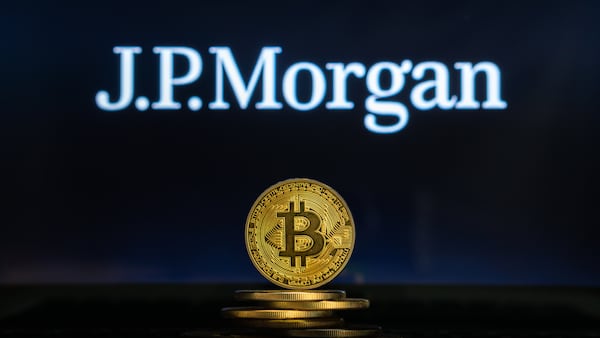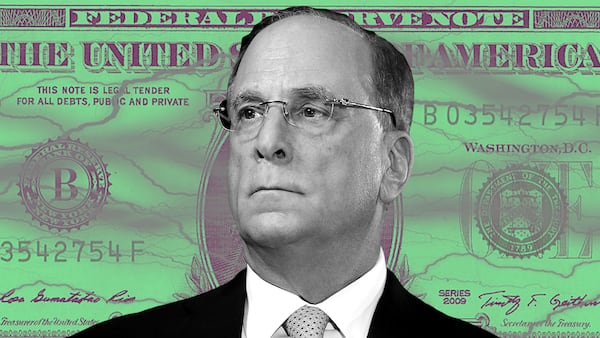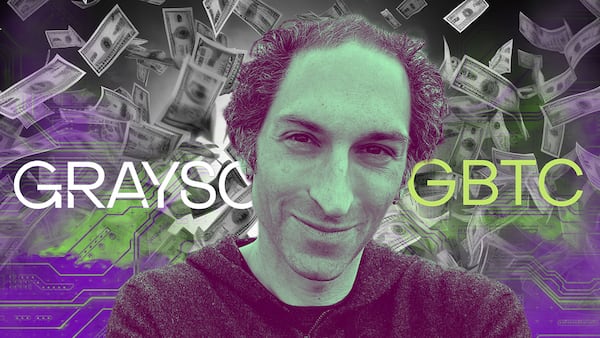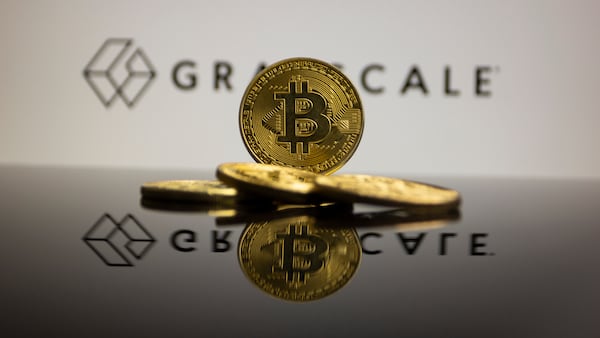- Genesis has been green lit to sell $1.6 billion worth of shares in Grayscale’s Bitcoin ETF.
- JPMorgan outlines the potential scenarios.
- It will also increase the pressure on Grayscale, who is already under siege by Wall Street giants like BlackRock.
Bitcoin investors celebrated when the cryptocurrency’s price shot past the $52,000 mark for the first time in two years.
The party may prove short-lived.
A bankruptcy court cleared Genesis’ plan to sell shares of multiple Grayscale investments, including 35.9 million shares of its Bitcoin exchange-traded fund.
The GBTC shares are worth around $1.6 billion.
The sale could lump more pressure on Grayscale, as well as the wider market.
“Genesis is supposed to repay creditors in cash or cryptocurrency depending on the type of currency they had deposited,” JPMorgan’s Nikolaos Panigirtzoglou, lead global market strategy analyst, told DL News via email.
JPMorgan’s understanding is that the “majority of customer deposits were in cryptocurrencies” such as Bitcoin, but some of the creditor claims were in cash.
“Given the total size of creditor claims — perhaps in the $5 billion to $6 billion range in today’s prices — it is likely that most of these GBTC shares will be sold and converted to cash thus potentially putting downward pressure on Bitcoin prices if sold over a short period of time,” Panigirtzoglou told DL News.
Rough ride
Grayscale’s GBTC has bled billions of dollars since it converted to a spot Bitcoin ETF in early January.
Outflows rose again this week and the Genesis sale will likely put more pressure on the digital asset manager.
Grayscale faces fierce competition from rivals such as BlackRock and Fidelity — the former’s ETF now holds over $6 billion in Bitcoin.
This makes it likely that Grayscale’s shares will see increased selling pressure in the weeks to come, according to Bloomberg Intelligence ETF analyst Eric Balchunas.
“We’ll see a couple big outflow days ahead for GBTC,” Balchunas told DL News.
BlackRock and Fidelity Investment have capitalised on Grayscale’s loss of ETF market share to date, according to JPMorgan.
Grayscale is losing its liquidity advantage to these rivals, JPMorgan analysts said on February 8.
The investment bank previously said that without its liquidity edge, Grayscale could see another $10 billion in outflows from its ETF.
“ETF liquidity is a virtuous circle, liquidity begets more liquidity,” Gabriel Selby, head of research at Kraken’s CF Benchmarks, told DL News.
Grayscale outflows could also revive a popular trade from the fund’s previous life as a closed-end trust, Selby, told DL News.
The slew of outflows from Grayscale’s fund to ETFs with lower fees has coincided with the liquidation of large GBTC holdings from the bankrupt estates like FTX, and now Genesis.
While those charged with liquidating the Genesis holdings will want to do so with minimal market impact to best make creditors whole, it might not be that easy, Selby said.
“If this sales pressure knocks up against a sustained Bitcoin rally, then its possible a new discount window could open up between GBTC shares and the price of the underlying, which might present an arbitrage opportunity,” Selby told DL News.
Market impact
The timeline for Genesis to offload is still unclear, and some analysts disagree on the market impact.
“It is highly possible that the Bitcoin or cash proceeds from the reported redemption could be reinvested into Bitcoin exposure, particularly by those creditors whose original claims were in Bitcoin,” Edmond Goh, head of trading at crypto market maker B2C2 told DL News.
Whether or not this potential for reinvestment will “manifest as ETF exposure is uncertain, many creditors would already be comfortable self-custodying and managing their Bitcoin positions already reducing the need to gain exposure via ETFs today,” Goh said.
“It’s not yet clear how much the additional GBTC outflows could go into other US spot bitcoin ETFs, if not otherwise used to purchase Bitcoin directly to repay creditors,” Coinbase’s head of institutional research David Duong said in a report on Friday.
“Much of these funds will likely remain within the crypto ecosystem, contributing to a neutral overall effect in the market.”
Fee war
An aggressive campaign to reduce management fees continues to play out, dubbed a “fee war,” by some analysts.
When it converted from a trust to an ETF, GBTC dropped its fee to 1.5% from 2%.
BlackRock charges just 0.12% on the first $5 billion and 0.25% on anything over that. Fidelity charges 0.25%. Cathie Wood’s Ark Invest’s fund charges zero fees, which will rise to 0.21 after the first six months.
VanEck announced on Thursday that it will reduce its fee to 0.2% from February 21, from 0.25%.
Adam Morgan McCarthy is a markets correspondent based out of London and Tyler Pearson is a junior markets correspondent at DL News based out of Alberta, Canada. Got a hot tip? Reach out to them at adam@dlnews.com or ty@dlnews.com.
Correction: a previous version of this article had an outdated figure for the value of the ETFs, they are about $1.6 billion, not $1.7 billion.







